Protesters hold placards at a demonstration against Indias new citizenship law in Mumbai on December 19, 2019. – Indians defied bans on assembly on December 19 in cities nationwide as anger swells against a citizenship law seen as discriminatory against Muslims, following days of protests, clashes and riots that have left six dead. Photo by PUNIT PARANJPE/AFP via Getty Images.
This PoLAR Online series, India’s Citizenship Amendment Act (CAA), is edited by Syantani Chatterjee and Natasha Raheja.
The controversial Citizenship Amendment Act (CAA) was signed into law by the Hindu nationalist BJP-led Government of India on December 12, 2019 amid nationwide protests opposing the act. The CAA, the sixth amendment to the 1955 Citizenship Act, expedites Indian citizenship for Hindus and other non-Muslim minorities (Parsi, Sikh, Jain, Christian, and Buddhist) from Afghanistan, Bangladesh, and Pakistan. Hailing these minorities from the neighboring Muslim-majority countries as persecuted religious minorities, the act enables access to Indian citizenship on religious grounds. While the bill passed both houses of the Parliament with a clear majority, protests against the CAA had begun well before this bill was passed. Neither the CAA nor its opposition can be seen in isolation. Local and Indigenous forms of resistance have had long roots in Kashmir and the Northeast in the face of sustained Indian occupation, which intensified with the revocation of Article 370 and the administration of the National Register of Citizens (NRC) in Assam. The sustained #NoCAA protests are part of a complex movement soldering different sections of the Indian civil society into a movement of resistance in the face of a seemingly unfazed governmental crackdown, police brutality against students, and state-sanctioned, anti-Muslim violence.
In this series, we emphasize disjuncture to collectively ask how citizenship persists as both an ideal of formal equality as well as a mechanism for the elaboration of social inequity. Although the concept of citizenship is premised on liberal ideals of enfranchisement, the rise of xenophobic nationalisms globally has revealed the very notion of citizenship to be an exclusionary category of belonging. Scholars have thus theorized citizenship as inherent with risk and fault lines (Petryna and Follis 2015), hinging on precarious claims to relative belonging (Geschiere et al 2006). In the context of India, contributors examine both the contradictions in the theoretical underpinnings of citizenship that set up binaries of citizen/non-citizen and insider/outsider, as well as the proliferation of documentary regimes that try to identify who is NOT a citizen. In conversation with scholarship that questions universal conceptualizations of citizenship which foreground the individual as the locus of rights and recognition (Chatterjee 2004), essays engage anthropological approaches to understanding how people struggle for legal recognition and social belonging as members of larger collectivities (Jayal 2013). If citizenship is a set of practices that shape and define membership in a given political community (Lazar 2013), the series asks, what practices and modes of association are taken up by people who are excluded from recognition?
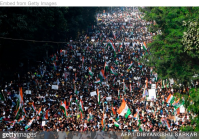 India’s Citizenship Amendment Act (CAA): Citizenship and Belonging in India
India’s Citizenship Amendment Act (CAA): Citizenship and Belonging in India
Syantani Chatterjee and Natasha Raheja
 Unwelcome Guests and Hostages: Minority Claims on the State
Unwelcome Guests and Hostages: Minority Claims on the State
Ghazal Asif and Natasha Raheja
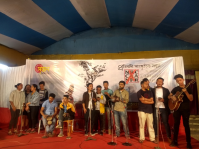 The Darjeeling plains: Citizenship as Minority Disenfranchisement in a Border District
The Darjeeling plains: Citizenship as Minority Disenfranchisement in a Border District
Abhishek Bhattacharyya
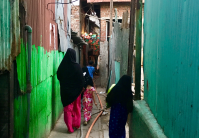 The Usual Suspects
The Usual Suspects
Syantani Chatterjee
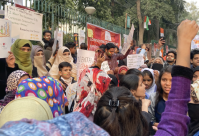 Collective Willfulness: Refashioning Empowered Girlhood
Collective Willfulness: Refashioning Empowered Girlhood
Karishma Desai
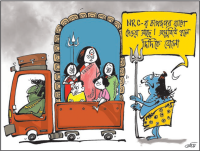 Between Faith and Panic
Between Faith and Panic
Sahana Ghosh
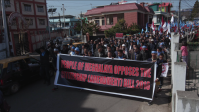 CAA and NRC Stoke the Wrong Problems in Meghalaya
CAA and NRC Stoke the Wrong Problems in Meghalaya
Nafis Hasan
 Hauntings of a Deadname: Proof, Ephemera, and Queer/Trans Citizenship
Hauntings of a Deadname: Proof, Ephemera, and Queer/Trans Citizenship
Brian A. Horton
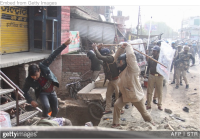 The New Visibility and Grotesque Impunity of Communalist Police Violence in #NoCAA and COVID India
The New Visibility and Grotesque Impunity of Communalist Police Violence in #NoCAA and COVID India
Beatrice Jauregui
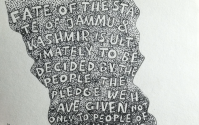 Frames of Solidarity: Finding Kashmir in Anti-CAA Protests
Frames of Solidarity: Finding Kashmir in Anti-CAA Protests
Mir Fatimah Kanth
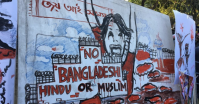 Mizo Indigenous Resistance Against CAA
Mizo Indigenous Resistance Against CAA
Mariangela Mihai
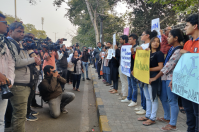 Protesting in Ahmedabad: Between Resistance and Restrictions
Protesting in Ahmedabad: Between Resistance and Restrictions
Maya Ratnam, Sarthak Bagchi, Mary Ann Chacko
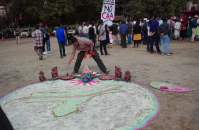 Borderland Citizenship
Borderland Citizenship
Sarbani Sharma and Aditi Saraf
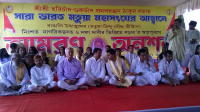 A State of Fear, Confusion and Hope: CAA and Bengali Dalit Refugees in India
A State of Fear, Confusion and Hope: CAA and Bengali Dalit Refugees in India
Praskanva Sinharay
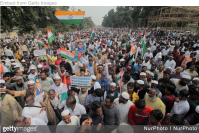 The Anti-Dalit, Anti-Adivasi Features of the 2020 Indian Citizenship Amendment Act
The Anti-Dalit, Anti-Adivasi Features of the 2020 Indian Citizenship Amendment Act
Suraj Yengde